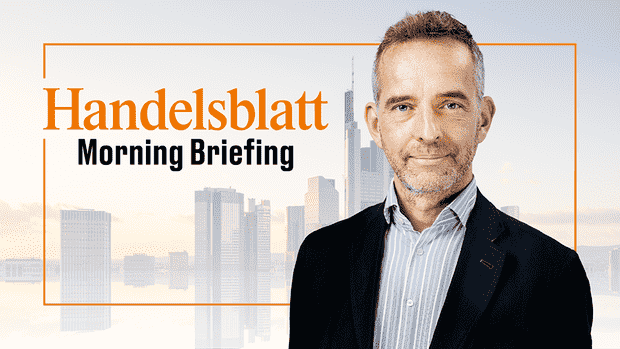Good morning dear readers,
seldom has the face of a crisis looked as harmless as this one. Sam Bankman-Fried, a chubby, curly-haired boy with a penchant for Bermuda shorts, could always be cast as The Hobbit. Instead, the thirty-year-old triggered the biggest crash in the recent history of cryptocurrencies with the bankruptcy of his trading platform FTX. The whereabouts of billions in investor money is unclear. Bankman-Fried has now interviewed our US correspondents Astrid Dörner and Felix Holtermann.
The most important finding from the conversation: Either Bankman-Fried had long since lost track of the money flows that flowed through his platform – or he is trying to portray it in retrospect in order to distract from his legal guilt. O-Tones:
- “I’ve never tried to cheat, to do anything bad. But yeah, I clearly screwed up quite a lot. And one way or another I will have to pay for it.”
- “If all creditors are ultimately compensated from a central pot, then customers could get 20 to 30 percent of their claim back.”
- “I spent a quarter of my time dealing with regulatory issues, a quarter managing people and a quarter thinking about what the future might hold. And then 75 percent of my time is gone without me having taken care of what really matters: the business, the risk management and the technology.”
Top jobs of the day
Find the best jobs now and
be notified by email.
The really exciting question is whether the crypto industry can recover from the FTX bankruptcy. The Financial Times reports that investors have also withdrawn their crypto capital from other trading platforms such as Binance, Kraken and Coinbase at a record pace. A net total of 91,363 bitcoins were withdrawn in November, at that time the equivalent of almost 1.5 billion dollars. It is unclear whether investors have sold their bitcoins or transferred them to so-called private wallets.
(Photo: IMAGO/photothek)
A lithium mine in Serbia, a train connection from Burkina Faso to the Ghanaian port of Takoradi, a data cable between Chile and Australia: With major projects like these, the traffic light wants to push back China’s growing global influence. The investment projects are on a confidential list that the German government has sent to the EU Commission. The paper is available to the Handelsblatt. The Berlin proposals are intended to help the EU initiative “Global Gateway” get off the ground, Europe’s answer to the Chinese “New Silk Road”.
Beijing is building highways, ports and rail routes around the world, thereby creating dependencies that extend as far as Europe. A year ago, EU Commission President Ursula von der Leyen proposed a “Global Gateway” to counter China’s striving for power. The idea: the Commission, Member States and the private sector should mobilize 300 billion euros and push ahead with large infrastructure projects worldwide.
However, little has happened since the announcement. Parts of the Commission are playing for time, fearing that development aid will in future be subordinated to geopolitical interests. The federal government now wants to make Brussels steam with its list.
In the coming weeks, however, political Brussels is likely to be primarily concerned with limiting the political fallout of the corruption scandal in the EU Parliament. Belgian investigators interrogated Greek Parliament Vice-President Eva Kaili and former Italian MEP Pier Antonio Panzeri on Friday. The judicial authorities are investigating the suspicion that a network around Kaili and Panzeri was harnessed and bribed for a Gulf state’s influence campaign. It is said to be Qatar. Arrest warrants were issued for Kaili on Sunday, according to Belgian media.
The Handelsblatt has been writing for weeks: The economic situation in Germany is better than the mood. Although that doesn’t mean much, because the mood at the moment is that sooner or later this winter we’ll be rubbing sticks together to somehow kindle a warming fire.
Yes, there are huge challenges, especially for German industry. But at least in the coming months things could be less severe than many feared. At least that is the tenor in the economic outlook of the Handelsblatt Research Institute (HRI). The colleagues at the HRI are now forecasting 1.9 percent growth for the current year and for 2023: “The chances are not that bad that Germany will still be able to avoid a recession, even if the progress of the Ukraine war with all possible consequences is not foreseeable is.”
For comparison: the joint diagnosis of the major economic research institutes from the beginning of October forecast economic growth of 1.4 percent in the current year and a minus of 0.4 percent for 2023. In just over a year we will know who was right.
It is also clear that we are experiencing stability on credit. The state is currently protecting citizens and companies from the worst consequences of rising energy prices with massive debt-financed programs.
Turkish President Recep Tayyip Erdogan In his own words, if he wins the election next year, he doesn’t want to run again. The 68-year-old announced that he would ask for the nation’s support one “last time” in 2023. After that, he will be handed over to younger politicians.
With his conservative Islamic party, the AKP, Erdogan is hoping for success in the parliamentary and presidential elections, which will take place in June at the latest. But Erdogan’s victory is anything but certain. Six opposition parties have joined forces with the intention of replacing Erdogan. The alliance has not yet announced a presidential candidate.
Handelsblatt Turkey correspondent Ozan Demircan sees the meaning of Erdogan’s announcement in Turkey’s political culture: “Anyone who wants to abdicate usually no longer receives criticism, but broad support out of respect. As a result, Erdogan is building up psychological pressure that could help him win the election one last time in 2023. And that is what matters to him.”
I wish you too a day full of respect and broad support.
Best regards
Her
Christian Rickens
Editor-in-Chief Handelsblatt


